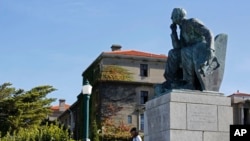Only a figure as intriguing as Cecil John Rhodes could still manage to stir controversy more than a century after his death. The British industrialist and colonialist is under fire in 2015 by young South Africans, who say his image is unfairly glorified and needs to be scrubbed from institutions like the venerable University of Cape Town.
The nation's ruling party agrees, though for the moment Rhodes' legacy remains part of the educational landscape.
Judging from his own words, Cecil John Rhodes would have a hard time in today’s multicultural South Africa. The British-born mining magnate, industrialist and politician came to the African continent as a teen in the 1870s, and had this to say about his adopted home:
“Africa is still lying ready for us,” he wrote in 1877. “It is our duty to take it. It is our duty to seize every opportunity of acquiring more territory and we should keep this one idea steadily before our eyes: that more territory simply means more of the Anglo-Saxon race: more of the best the most human, most honorable race the world possesses.”
It is for pronouncements like that that students at the University of Cape Town, South Africa's top academic institution that was built on land donated by Rhodes, want his image removed. In the past month, students have pelted his prominent statue with excrement, amid claims he is the very embodiment of “white arrogance.”
Late last month, the university senate voted 181 to one to remove the statue from campus to an undecided location. The move has also prompted discussion at South Africa’s Rhodes University, which is considering changing its name.
The ruling African National Congress, which has dominated South African politics since the end of apartheid in 1994, has also given its support to the student movement.
“Rhodes’s name is synonymous with the darkest era of our country’s history, in which black people were subjected to a murderous, unjust, inhumane, criminal and oppressive system on the basis of the color of their skin,” the ANC said in a statement. “… Having monuments glorifying the legacy of such individuals who embody such an evil system, particularly at a university, which is still struggling with racial transformation more 20 years into democracy, undermines our on-going endeavour for national reconciliation and unity.”
Rhodes may be dead, but the protesters say the problem is that his legacy of white supremacy is alive and well in the Rainbow Nation. For example, they say, UCT’s academic staff is overwhelmingly white, and there still exist deep divisions between black and white students.
South Africa, wrote UCT Constitutional law professor Pierre De Vos, is “entangled with the past because everything all of us assumed, everything we believed, everything drummed into our collective consciousness over 350 years of colonial conquest and racial domination did not evaporate into thin air in 1994.”
The nation may have ended the racist apartheid system that year, but economic inequality has not kept pace with that social transformation. For example, the last census found the average white family earns six times more than the average black family. In a country where just less than 80 percent of the population is black, nine out of 10 South Africans below the poverty line are black.
That’s why some South Africans on both sides of the issue argue the Rhodes statue is simply a symbol.
“The statue is a symbolic form of discrimination and if it stays, UCT will remain untransformed,” UCT researcher Zethu Matebeni argued in local media. “It contributes to the institutional culture that makes UCT untransformed.”
But the federal chairman of the opposition Democratic Alliance, Wilmot James, argued in a statement the university should acknowledge its history by keeping the statue.
“Why not build a statue of another figure that engages Rhodes in perpetual conversation?” he wrote. “This would symbolize the dialogue and reflection that must happen in each generation, not in the absence of the past, but precisely because of it. Righteousness is not the sole preserve of some; neither is morality the possession of the victors or rulers of the day.”
He also voiced a rare note of support for Rhodes, who founded the well-known Rhodes Scholarship at the University of Oxford, a program enjoyed by many African luminaries and former U.S. president Bill Clinton.
"Cecil John Rhodes did awful things as part of his colonial project. But through forward thinking by later generations good was able to come, specifically in the area of education," he said.
What would Rhodes think of his rejection by modern South Africans?
One wonders if he would care; after all, this is the man who famously said, “Remember that you are an Englishman, and have consequently won first prize in the lottery of life."
Do you think the University of Cape Town should remove the statue of Cecil John Rhodes? Chime in in the comments, below.




